A Texas Feud:
The Killing of Gus Palmer
and
Buddy Palmer
This article concerns the killings of Gus Palmer and Buddy Palmer during a feud in East Texas in
1906 and what has been discovered in primary source documents regarding these two murders. Eventually, even
the Texas Rangers became involved in this East Texas feud.
First, it would be helpful to get some idea of who Gus and Buddy Palmer were. We will look briefly
at who their grandfather and father were and then look at the evidence regarding the events themselves.
Martin Parmer
One of the eccentric characters in the early Colonial Texas period was Martin Parmer.
Born Martin Palmer in Virginia, he later changed the spelling of his last name to Parmer. He was known in
Missouri and Texas as the "Ring Tailed Panther." Parmer was a frontiersman and an Indian fighter. He
had been a legislator in the first Missouri General Assembly and was later elected a Senator in the Missouri
General Assembly. Parmer moved to Texas in 1825. Upon arriving in Texas, Parmer became a leader of
the ill-fated Fredonian Rebellion in 1826-1827. In 1836, Parmer signed the Texas Declaration of Independence
at Washington-on-the-Brazos and serve as the Chairman of the Committee that drafted the Constitution of the
Republic of Texas. In 1839, Republic of Texas President, Mirabeau B. Lamar, appointed Martin Parmer to be the Chief
Justice of Jasper County, Texas.
Martin Parmer, for all his public service, was a very dangerous man who had killed or attempted to
kill many different men throughout his lifetime including Indians, Mexicans and Anglos. Martin Parmer was the
father of at least 16 children from four different wives. Upon reaching adulthood, most of these
children restored the spelling of the family name to Palmer.
John Martin Palmer
Martin Parmer's youngest son was John Martin Palmer who was born the same year Texas won her
independence from Mexico [1836]. John Martin Palmer served as a Private in the 26th Texas Cavalry during
the Civil War. By most accounts, he was respected and beloved by just about everyone who knew him. Two of his
sons were Augustine H. Palmer (Gus Palmer) and J. L. Palmer (Buddy Palmer).
[John Martin Palmer Obituary from Houston paper]
"Palmer Descendants"
I first became interested in the subject of the deaths of Gus and Buddy Palmer when I read an
article written by Mary Dell Palmer Rosier in 1994 for a local history booklet titled San Jacinto County: A
Glimpse Into the Past, Book III, A Collection of Historical Articles, compiled by Iva Block,
pp. 72-73. The article by Mary Dell Palmer Rosier was titled "Palmer Descendants." Beginning on page
72, Mrs. Rosier related the following events:
"At the General Election , San Jacinto County, November 12, 1900, A. H. Palmer was
elected Constable, Precinct No. 6. This included the Oakhurst and surrounding area. According to
his records, he collected the taxes due the County, and delivered them to the tax office in Coldspring.
His records also show he collected fines, and notified persons selected for jury duty. During his
collection of taxes one time, a (Negro) man tried to rob him. To prevent the robbery of a considerable
amount of tax money, Gus shot and killed the man. No charges were filed and [the] Grand Jury no billed
Mr. Palmer.
Another time Gus Palmer shot and killed a man who was in Buddy Palmers' tailor
shop. The story goes, "Fifteen year old Will Kay was keeping the tailor shop while Buddy went to Houston
to purchase material. Gus Palmer was leaning on the counter teasing Will about the girls. A Mr. Jones
came in and unbeknowing to Gus he stuck his pistol in Gus' temple and pulled the trigger. The gun did not
fire, and a fight started. Will stated, "They fought all over the shop, even knocking the stovepipe down.
Sometime during the fight Gus was able to draw his gun and he shot Mr. Jones."
October 12, 1906, Gus Palmer made a trip to Huntsville to see a Doctor. The
next day, he was at the depot waiting for the trolley back to Oakhurst, when he was ambushed and shot.
The first shot did not kill him, but while he was lying on the platform begging for his life, he was shot again
and was killed. This killing was known to be a paid killing and caused a lot of tension in
Oakhurst. People were very upset, and all the men were wearing their guns. It was a very
frightening time, women and children stayed in their houses. The men ventured out only to go to
work. Buddy Palmer, a younger brother of Gus Palmer was on his way home for dinner, as was the custom of
that time, the stores all closed during the dinner hour, 12 noon to 1pm. Buddy was walking past the
Dolive store when shots rang out. Someone inside the Dolive store had shot through a crack in the door
and killed Buddy. This happened on October 18, 1906, one week after Gus Palmer was ambushed in
Huntsville.
John Martin Palmer and the remaining family moved to Houston a few years after this
tragedy."
Primary Sources
After reading this account by Mrs. Rosier, I wondered if these stories about the
feud and the deaths of Gus and Buddy Palmer were true or were they just an example of family tradition or legend
that got more entertaining in the retelling over time? So, I set out to see if these stories were
true by searching for any primary historical sources materials dating from the time period of the events themselves
that might corroborate her story. It turns out that the family stories were indeed true and that Mrs. Rosier's
reporting of them was extremely accurate after almost 90 years..
GUS PALMER
Due to Old Feud.
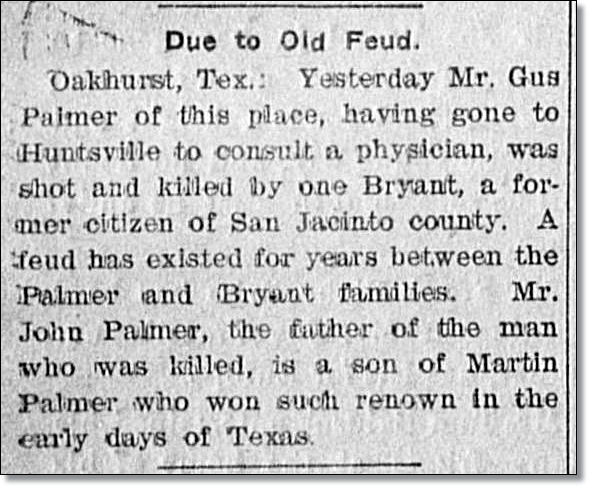
Due to Old Feud
Oakhurst Tex.: Yesterday Mr. Gus Palmer, of this place, having gone to
Huntsville to consult a physician, was shot and killed by one Bryant, a former citizen of San Jacinto
county. A feud has existed for years between the Palmer and Bryant families. Mr. John Palmer,
the father of the man who was killed, is a son of Martin Palmer who won such renown in the early days of
Texas.
This article appeared in the Shiner Gazette, Shiner, Texas, Vol. 14, No. 14,
on Wednesday, October 17, 1906, p. 2. Here someone named Bryant is identified as the killer. This
article says the feud was between the Palmer and Bryant families.
News in Brief from Texas
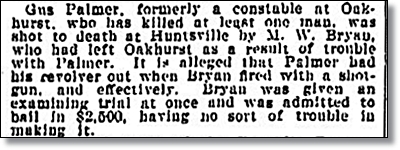
Gus Palmer, formerly a constable at Oakhurst, who has killed at least one
man, was shot to death at Huntsville by M. W. Cryan, who had left Oakhurst as a result of trouble with
Palmer. It is alleged that Palmer had his revolver out when Bryan fired with a shotgun, and
effectively. Bryan was given an examining trial at once and was admitted to bail in $2,500, having no
short trouble in making it.
Article from The Daily Picayune, New Orleans, Louisiana,Monday, October 15,
1906, Vol. LXX, No. 264, p. 11. here M. W. Bryan is identified as the killer.
Killing at Huntsville
Is Shot to Death at Railway Station.
Market Man Arrested
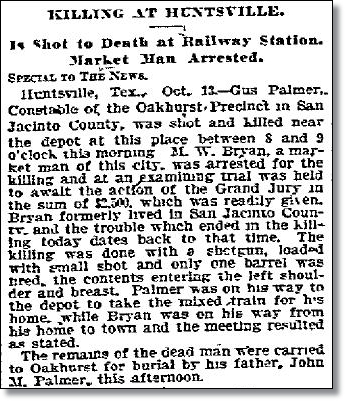
Special to the News.
Huntsville, Tex., Oct. 13. - Gus Palmer, Constable of the Oakhurst
Precinct in San Jacinto County, was shot and killed near the depot at this place between 8 and 9 o'clock
this morning M. W. Bryan, a market man of this city, was arrested for the killing and at an
examination trial was held to await the action of the Grand Jury in the sum of $2,500 which was readily
given. Bryan formerly lived in San Jacinto county and the trouble which ended in the killing today
dates back to that time. The killing was done with a shotgun, loaded with small shot and and only one
barrel was fired, the contents entering the left shoulded and breast. Palmer was on his way to the
depot to take the mixed train for his home, while Bryan was on his way from his home to town and the
meeting resulted as stated.
The remains of the dead man were carried to Oakhurst for burial by his
father, John M. Palmer, this afternoon.
This article appeared in The Dallas Morning News, Sunday, October 14, 1906,
Vol. XXII, No. 14, p. 5.
BUDDIE PALMER
Tragedy at Oakhurst
Buddy Palmer is Killed - Brother Recently Killed
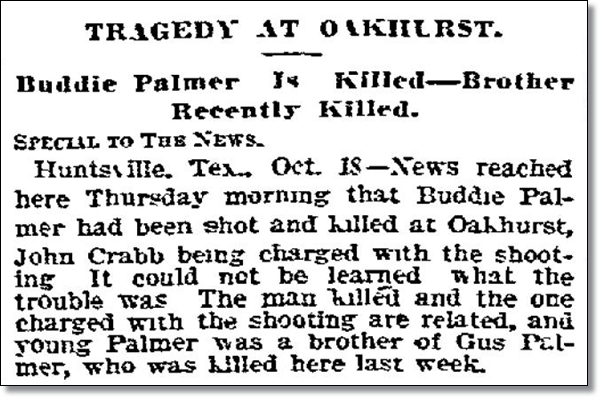
Special to the News.
Huntsville, Tex., Oct. 18 - News reached here Thursday morning that Buddie Palmer had
been shot and killed in Oakhurst, John Crabb being charged with the shooting It could not be learned
what the trouble was The man killed and the one charged with the shooting are related, and young
Palmer was a brother of Gus Palmer, who was killed here last week.
See this article in the Dallas Morning News, Friday, October 19, 1906, Vol.
XXII, No. 19, p. 14. John Crabb is identified as the man charged with the shooting.
J. L. Palmer Killed
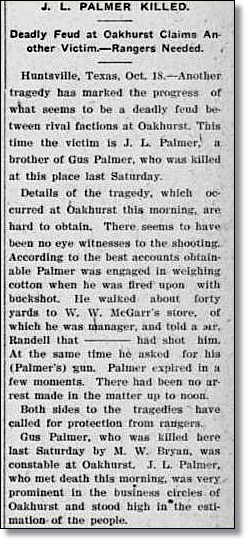
This article appeared in the Palestine Daily Herald, Palestine Texas, Vol. 5,
No. 83, Friday, October 19, 1906, p. 3.
Jailed for Safe Keeping
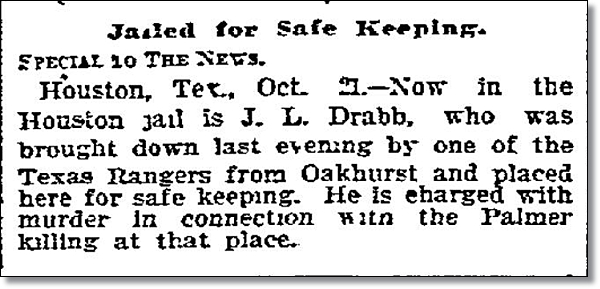
Houston, Tex. Oct. 21. - Now in the Houston jail is J. L.
Drabb [Crabb], who was brought down last evening by
one of the Texas Rangers from Oakhurst and placed here for safe keeping. He is charged with
murder in connection with the Palmer killing in that place.
This article is from The Dallas Morning News, October 22, 1906, Vol. XXII,
No. 22, p. 3.
Experiences of a Ranger
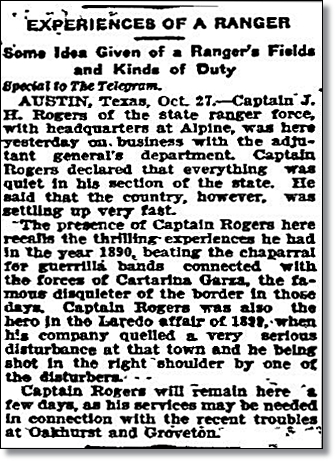
Captain Rogers will remain here a few days, as his services may be needed
in connection with the recent troubles at Oakhurst and Groveton.
This article appeared in the Fort Worth Star-Telegram, Sunday, October 28,
1906, Vol. XXIII, No. 131, second section, p. 2.
Nell Lee Streeter Frost Sergent
[November 19, 1902 - July 27, 2003]
"My memories of John Martin Palmer (Parmer) and
Elizabeth (Liza) Shepperd Palmer"
Many years after the murder of J. L. (Buddy) Palmer, Nell Lee Streeter Frost Sergent,
the grand daughter of John Martin Palmer and the daughter of Sarah Palmer and Wilbur C. Streeter recorded
her memories of the events on January 16, 1992. Buddy Palmer was the brother of Sarah Palmer and the
uncle of Nell Lee Streeter. In this account, we find that J. L. Palmer's initials stood for "Jacob Lee."
We also see how the murder of Buddy Palmer affected Nell Lee Streeter when she was just a very young child.
Jacob Lee Palmer (Uncle Buddy) was killed at a very young age (possibly twenties) in a
feud between the Robinsons and Palmers in Oakhurst, Texas. Uncle Buddy was weighing grain outside the
feed store, when he was shot down. One of the Robinsons was put in the pen and must have died there,
as years later we heard he was still in there. Uncle Buddy was my favorite, and my middle name is a
request from him that I be called Nell Lee, when I was born. I remember after he was 'laid out'
on his bed, I slipped into his room and patted his feet and kissed them. I was very young, but I
still remember this vividly.
Here, Nell Lee Streeter says the feud was between the Robinsons and
the Palmers.
Banks Gets Life Sentence.
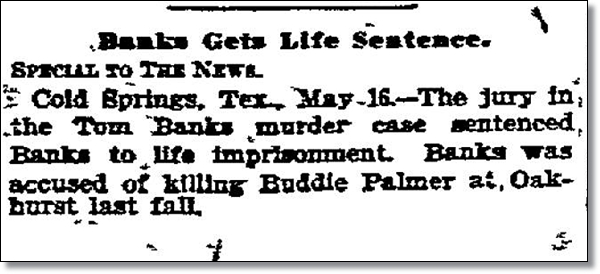
Special to the News.
Cold Springs, Texas., May 16.-The jury in the Tom Banks murder
case sentenced Banks to life imprisonment. Banks was accused of killing Buddie Palmer at Oakhurst last
fall.
This article appeared in The Dallas Morning News on May 15, 1907,
Vol. No. p. 8.
John Crabb Aquitted.
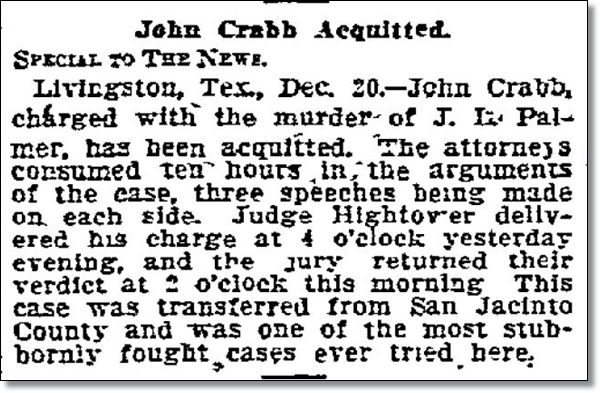
Special to the News.
Livingston, Tex., Dec. 20. - John Crabb, charged with the murder of J. L. Palmer,
has been aquitted. The attorneys consumed ten hours in the arguments of the cas, three speeches
being made on each side. Judge Hightower delivered his charge at 4 o'clock yesterday evening, and
the jury returned their verdict at 2 o'clock this morning This case was transferred from San
Jacinto County and was one of the most stubbornly fought cases ever tried here.
This article appeared in The Dallas Morning News on Monday, December 21,
1908, Vol. XXIV, No. 82, p. 11.
Banks v. State
108 SOUTHWESTERN REPORTER 693
Tom Banks appealed his murder conviction. Much of the evidence from the trial is
reported in the appeal of Tom Banks conviction to the Texas Court of Criminal Appeals. This evidence
provides a great deal of detail that the brief newspaper articles above do not provide.
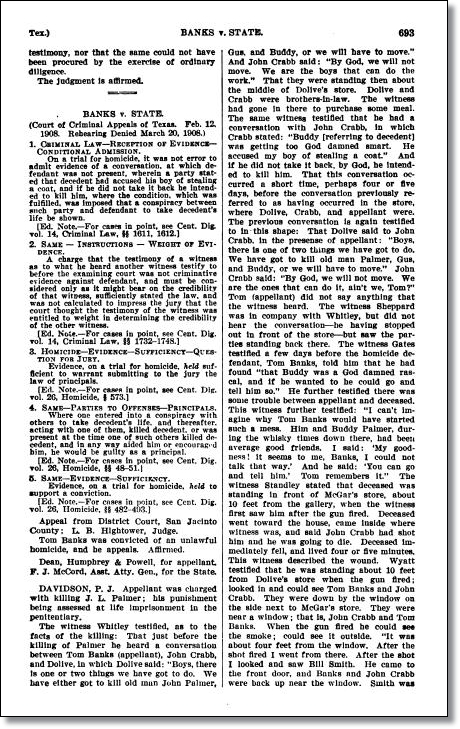
(Court of Criminal Appeals of Texas. Feb. 12, 1908. Rehearing
denied March 20, 1908.)
Appeal from District Court, San Jacinto County; L. B. Hightower,
Judge.
Tom Banks was convicted of an unlawful homicide, and he appeals.
Affirmed
Dean, Humphrey & Powell for appellant. F. J. McCord, Asst. Atty.
Gen. for the State.
DAVIDSON, P.J. Appellant was charged with killing J. L. Palmer; his
punishment being assessed at life imprisonment in the penitentiary.
The witness Whitley testified, as to the facts of the killing: That
just before the killing of Palmer he heard a conversation between Tom Banks (appellant), John Crabb, and
Dolive, in which Dolive said: "Boys, there is one or two things we have got to do. We have either got
to kill old man John Palmer, Gus, and Buddy or we will have to move." And John Crabb said: "By ___, we
will not move. We are the boys that can do the work." That they were standing then about the
middle of Dolive's store. Dolive and Crabb were brothers-in-law. The witness had gone in there
to purchase some meal. The same witness testified that he had a conversation with John Crabb in which
Crabb stated: "Buddy (referring to decedent) was getting too ___ damned smart. He accused my boy of
stealing a coat." And if he did not take it back, by ___, he intended to kill him. That this
conversation occurred a short time, perhaps four or five days, before the conversation previously referred
to as having occured at the store, where Dolive, Crabb and appelant were. The previous conversation is again
testified to in this shape: That Dolive said to John Crabb, in the presence of applellant:
"Boys, there is one of two things we have got to do. We have got to kill old man Palmer, Gus, and Buddy, or
we will have to move." John Crabb said: "By ___, we will not move. We are the ones who can do
it, ain't we, Tom?" Tom (appellant) did not say anything that the witness heard. The witness
Sheppard was in company with Whitley, but did not hear the conversation - he having stopped out in front of
the store - but saw the parties standing back there. The witness Gates testified a few days before the
homicide defendant, Tom Banks, told him that he had found "that Buddy was a ___ damned rascal, and if
he wanted to he could go and tell him so." He further testified that there was some trouble
between appelant and deceased. This witness further testified: "I can't imagine why Tom Banks would
have started such a mess. Him and Buddy palmer during the whiskey times down there, had been average
good friends. I said 'My goodness! it seems to me Banks, I could not talk that way.' And he
said: 'You can go and tell him.' Tom remembers it." The witness Standley stated that deceased
was standing in front of McGar's store, about 10 feet from the gallery, when the witness first saw him after
the gun fired. Deceased went toward the house, came inside where witness was, and said John
Crabb had shot him and he was going to die. Deceased immediately fell, and lived four or five
minutes. This witness described the wound. Wyatt testified that he was standing about 10 feet
from Dolive's store when the gun fired; looked in and could see Tom Banks and John Crabb. They
were down by the window on the side next to McGar's store. They were near a window; that is, John
Crabb and Tom Banks. When the gun fired he could see the smoke; could see it outside. "It was
about four feet from the window. After the shot fired I went from there. After the shot I looked
and saw Bill Smith. He came to the front door, and Banks and John Crabb were back up near the
window. Smith was
See Southwestern Reporter Volume 108, pp. 693-695.
| 









